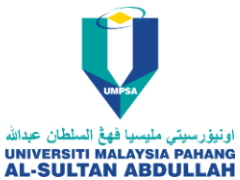
Universiti Malaysia Pahang
Green Education Ranking
#784
About Universiti Malaysia Pahang
Established as a technical university in 2002, Universiti Malaysia Pahang Al-Sultan Abdullah (UMPSA) offers various engineering- and technology-based technical programmes, including high-level Technical and Vocational Education and Training (TVET) programmes. After 21 years of glory, Universiti Malaysia Pahang (UMP) is now branded as Universiti Malaysia Pahang Al-Sultan Abdullah (UMPSA). His Majesty Yang Maha Mulia Seri Paduka Baginda Yang di-Pertuan Agong XVI Al-Sultan Abdullah Ri’ayatuddin Al-Mustafa Billah Shah Ibni Almarhum Sultan Haji Ahmad Shah Al-Musta’in Billah, who is also the UMP Chancellor contributed a lot in shaping the country leadership, empowering education, disseminating knowledge and religion as well as the concern of His Majesty The King towards the people, especially in Pahang Darul Makmur. The university started as the University College of Engineering and Technology Malaysia (KUKTEM), a technical university established on 16 February 2002. After five years of operation, the Government of Malaysia announced the change of the name KUKTEM to Universiti Malaysia Pahang (UMP), effective 1 February 2007. The university’s branding to UMPSA, when it was at the peak of success, was based on the Universiti Malaysia Pahang Order (Incorporation) (Amendment) 2023 (P.U. (A) 116/2023) effective 14 April 2023. This branding coincides with the university’s vision towards a leading technological university, and it will realise the aspiration of excellence achieved through academic empowerment and impactful research outputs and produce outstanding graduates to become quality human capital in driving excellent national development. This branding will also build the university’s visibility, reputation and capabilities, which aligns with the university’s development and achievement at the age of 21 this year. Ranked as one of the best in research and innovation within the classifications of Malaysia Technical University Network (MTUN) and Non-Research University (Non-RU), UMPSA is steadfastly committed to innovating and developing unique academic programmes through strategic international collaborations. A milestone of such innovation is UMP’s world-class dual-degree engineering programme in collaboration with Germany’s Karlsruhe University of Applied Sciences (HKA) – now seen as the benchmark for other public institutions of higher learning in Malaysia. In research, UMPSA collaborates with local industries to focus on industry-related applications. Such research collaboration enriches the teaching and learning modules at the university and simultaneously promotes the commercialisation of research output and products.
About World Green University Ranking
World
Green University Ranking 2024 is a
scholarly acknowledgment of educational
institutions standing at the forefront of
Education for Sustainable Development (ESD) and
leading the Green Education Transformation
(Education 6.0).
World Green University Ranking classifies
universities based on the six pillars of the
Holistic Green Education Framework, including
leadership governance, curriculum, innovation,
facilities, human capital, and community
partnerships.
The methodology employed in our Green Education Ranking is designed relying on the six pillars of the Holistic Green Education Framework. Each pillar contributes to the institution’s overall score, with a carefully assigned weight reflecting its significance in fostering sustainability. The total weight of the six pillars collectively amounts to 100%, signifying a balanced evaluation across critical dimensions of Green Education. Within each pillar, various standards are carefully assessed, with weights ranging between 1 and 2, emphasizing the varying importance of each criterion. This nuanced approach ensures a holistic evaluation and offers an insightful measure of universities commitment to Green Education Transformation (Education 6.0).
| # | Six Pillars of Green Education Framework (6Gs). | Weight |
|---|---|---|
| 1 | Green Educational Leadership | 14% |
| 2 | Green Curriculum | 17% |
| 3 | Green Innovation and Research | 19% |
| 4 | Green Facilities | 15% |
| 5 | Green Human Capital | 19% |
| 6 | Green Communities | 16% |
| Total | 100% |

